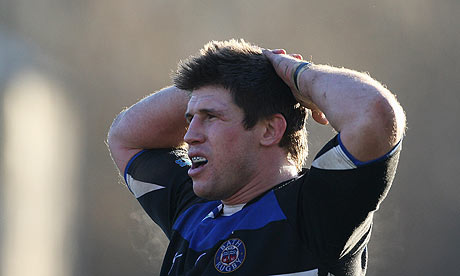
The Twickenham panel that last night banned the former Bath players Michael Lipman, Alex Crockett and Andy Higgins for nine months for refusing to take tests for illicit drugs heard that rumours were rife about players at the Recreation Ground taking substances such as cocaine. It was also told that, when the club started an investigation into the allegations in May, six players were suspected.
Lipman, Crockett and Higgins were accused by the Rugby Football Union of bringing the game into disrepute by refusing to give hair and urine samples, fuelling adverse publicity. Additional charges of taking an illegal substance(s) or giving the impression that they had done so were dropped on the opening day of the hearing last week, but the three-man panel, chaired by the Rugby Football Union's chief disciplinary officer, Jeff Blackett, decided that the players refused to take the tests because they had ingested drugs during an end-of-season party in London on 10 May or were too drunk to remember whether they had done so.
Bath launched an investigation into the party after newspaper reports about fights and drug-taking. The club's second-row Justin Harrison resigned after being summoned to appear before an inquiry. An RFU panel last month banned him for eight months after he admitted taking cocaine in a London pub, but he insisted he had no evidence of other players taking the drug.
Lipman, who was in the England squad last season, Crockett and Higgins resigned from Bath on 1 June having twice refused to take drug tests. They argued to the panel they were not obliged to do so under their contracts, there was no programme for out-of-competition testing for recreational drugs and Bath had infringed their human rights. The panel disagreed, saying after the Bath prop Matt Stevens was banned for cocaine the club had every right to take action to dispel rumours or accusations about drug-taking. It criticised the three for effectively going absent without leave when the testing dates were set.
"It is clear from the evidence that we have heard that many rumours about drug taking existed in and around the Bath rugby squad," wrote the panel in its judgment. "We heard of one instance where Lipman's name was written as part of graffiti on a Bath bridge and we heard that the management of the club had been concerned for some time about other unspecified rumours and the damage such rumours might have on the club.
"Some players voiced suspicions about drug taking during the [London] trip. A named player accused Higgins and Crockett of involvement with drugs [in a pub] and he did not retract those accusations on 11 May when the players met again. Indeed at least one of these suspicions turned out to be true because Justin Harrison has subsequently admitted that he ingested what he believed to be cocaine on 10 May, albeit not in the presence of any other Bath players.
"Given the background of Matt Stevens' positive test we believe it was perfectly reasonable and proper for the Bath management to act on rumours which reached them after the London trip ... If the players had nothing to fear from taking a drugs test then they would have taken them."
Lipman, Crockett and Higgins have denied taking drugs. Their solicitor said: "We would like to emphasise that the charges that they had actually taken cocaine were dismissed at the beginning of the proceedings."

